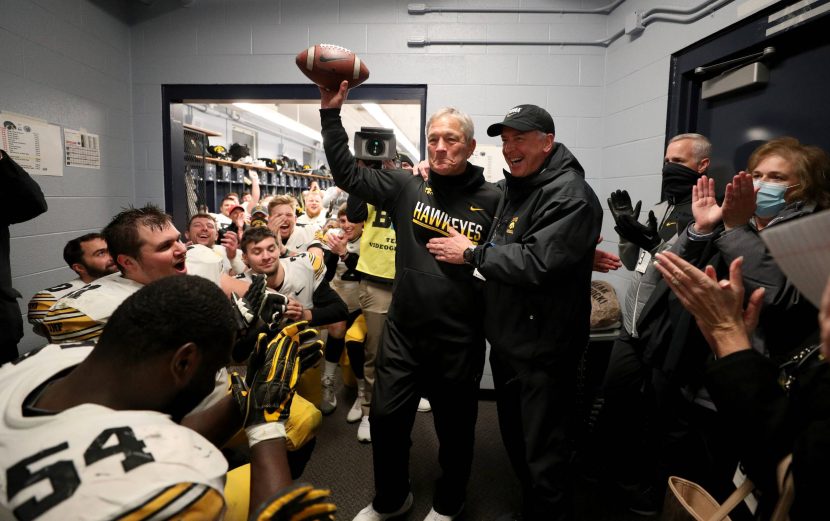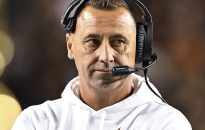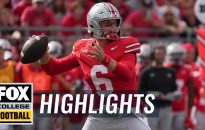Kirk Ferentz on NIL, the Transfer Portal, and the 105-Man Roster Limit (Photo by Iowa Hawkeyes (YouTube / Hawkeye Sports)) The college football world is in the middle of massive upheaval: the arrival of Name, Image, and Likeness (NIL) money, the wide-open transfer portal, the expansion of the College Football Playoff, and much more. Iowa […]

Kirk Ferentz on NIL, the Transfer Portal, and the 105-Man Roster Limit
The college football world is in the middle of massive upheaval: the arrival of Name, Image, and Likeness (NIL) money, the wide-open transfer portal, the expansion of the College Football Playoff, and much more. Iowa head coach Kirk Ferentz sounded off on several of those issues at a Friday media availability, starting with the transfer portal.
“I think we’re moving in the right direction, being college football,” Ferentz said when asked what he would change about the way the portal works at present. “I think the proposed model right now, is solid. [The] question is can we enforce it, really make it a reality. I’ll believe that when I see it.”
“One thing is the NFL, it has perfect clarity in terms of what you can and can’t do. [They] also have a Collective Bargaining Agreement, so that makes it easier,” Ferentz noted. “Everybody is under contract in the NFL, coaches and players, and they’re binding contracts. You sign a deal, then you live that deal out, or you sit.”
“Anyway, what we need is some structure and clarity,” said Ferentz. “I think everybody should be willing to sign on. You could argue the same thing about coaches. But sign on and live by the binding agreement.
Advertisement
“Having structure would be nice,” Ferentz reiterated. “Then enforcement in the NFL is very consistent all across the board. Everybody plays by the same rules. That’s the utopia. We’re never going to get that in college football.”
One idea that could be part of that structure and level playing field? Some sort of salary cap.
“[A] salary cap, which I think we’re kind of getting there, if we could enforce it,” Ferentz said. “That will be a great start. Then again, if you’re going say you’re going to do this, you got to do it. Not a life sentence, but prescribed, whatever you agree to write on a contract, do it, live it out.”
The timelines around the transfer portal have been criticized often, and especially this season as the portal overlapping with the expanded College Football Playoff has created some awkward situations for players considering moves to other schools. Iowa has been a first-hand participant in the process, having hosted Penn State backup quarterback Beau Pribula on a visit earlier this week.
“[It] wasn’t intentional by any stretch of the imagination, but the way the calendar falls,” Ferentz noted. “We have so many unintended bad consequences here. The poor kid [Pribula] had no choice, basically had no choice. It’s the worst thing in the world. A college athlete, you work hard, you get a chance to play in the Playoffs, you know what I mean? It’s really hard.”
“This whole system has taught some athletes really bad lessons, too,” Ferentz added. “I’m not suggesting that is one. That’s one where there was no good choice for the athlete. I really feel badly for him. I have empathy for him. Empathy for Penn State, too. That hurts their football team. It’s all because of a circumstance.”
NIL has transformed all aspects of college athletics, but it’s had its most profound impacts in recruiting, both with high-school athletes and college athletes in the transfer portal. Ferentz discussed how he felt Iowa was positioned in terms of NIL.
“I think we’re fine,” Ferentz said. “There are some extreme situations that are really interesting. Literally mind-blowing sometimes. Let me qualify every statement I’m going to make here. Nothing is substantiated. Going back to the point about the NFL, things are in black and white on paper. It’s usually after like free agency goes on, you find out later on what the contracts are.”
“There’s been so much embellishment and exaggeration on numbers [in NIL]. I can tell you that from the past. Currently I don’t know if it’s accurate. Some of the numbers you hear are just outrageous,” Ferentz noted.
“If [these programs] have money in their pockets, which a couple schools do, I’m thinking of one in particular that had a really good benefactor, is that what they call these guys, like Great Expectations. He dropped a big check on them and they’re spending. They’re spending. I’m not sure I see the value in what they’re spending,” Ferentz said.
“There are a lot of examples like that,” Ferentz noted. “This is a really interesting period. We’ll see what happens here. Next year will be more interesting. We’ll be able to gauge things a little bit better. I think we’re doing fine. We’re not crazy. We’re not going out there and going crazy.”
Finally, Ferentz also discussed the looming 105-player roster limit. Previously, schools could only offer 85 scholarships, but they could have an unlimited number of walk-on contributors. Starting in 2025, football rosters will be capped at 105 players. While the roster limit doesn’t officially kick in until August 1, Ferentz explained that Iowa has been proactive about having discussions about players who will not be part of that 105-man roster.
“We felt very strongly as a staff we owed it to any player that might be in jeopardy to let them know the week following our last game what the status was, give them an opportunity to go out and prepare for whatever they want to prepare for,” Ferentz explained.
“We’ve had guys leave the program at that point. They’ve left the program. We have other guys that are going to go to other places but staying with the program throughout the bowl,” Ferentz said.
“Everybody is getting bowl gifts, all that stuff. Everybody had the opportunity to stay with us and go to the bowl site and finish out this with us as a team member. They had the option of doing whatever they wanted to do. We’ve had other guys leave and already find other homes. We just felt like it was the right thing to do to give them a chance if they want to prepare for the future, do it. If they want to stay here, that’s great, too.”
Having those discussions has been difficult, Ferentz noted, and the move to cut rosters all the way down to 105 was especially problematic in Ferentz’s eyes. “It’s been the hardest part of this month,” he said. “It could have been so easily avoided if we stair-stepped it. I’m sure it was a financial decision. Nobody asked me for my opinion or filled me in on the details. I’m sure it was a financial decision, like everything we do.”
“I would argue whatever the dollar amount was, keep it the same and spread it out on 120, 118, spread it among 118 instead of 105 and not have bloodletting,” Ferentz suggested. “That’s the regrettable part in my mind.”
The reality of only having 105 players on a roster will also present certain challenges, as Ferentz explained. “Then the whole next chapter is going to be really interesting, too, because practice with 105 guys in college football — this is not the NFL,” he said.
“Nobody even brought up what happens if a guy has a season-ending injury. We can’t go out and bring somebody in to replace that guy. It makes practice a challenge, makes developing a team a challenge,” said Ferentz.
“Those or questions or discussions for post January. I’m not looking forward to that. I think it impacts a program like ours more so than other people that recruit five-star athletes every year because they’re a little bit more ready-made,” Ferentz suggested.
“[But] that’s the way it goes. We’ll figure out a way to make it an advantage.”














